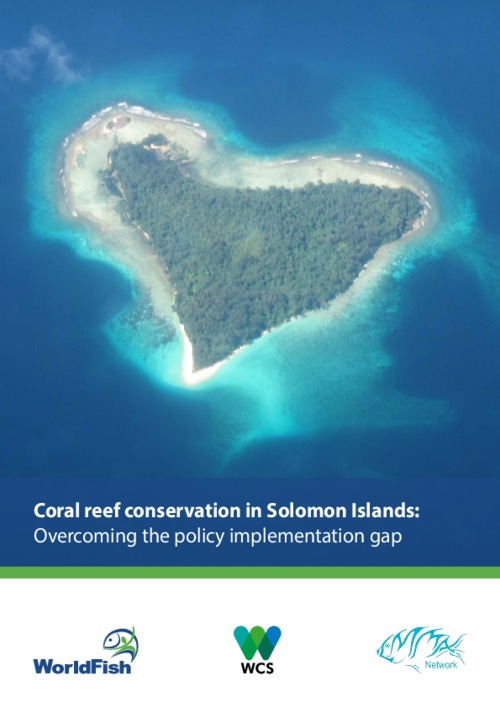Please use this identifier to cite or link to this item:
https://hdl.handle.net/20.500.12348/4460
Coral reef conservation in Solomon Islands: Overcoming the policy implementation gap.
| dc.creator | Van Der Ploeg, J. | en_US |
| dc.creator | Jupiter, S. | en_US |
| dc.creator | Hughes, A. | en_US |
| dc.creator | Eriksson, H. | en_US |
| dc.creator | Notere Boso, D. | en_US |
| dc.creator | Govan, H. | en_US |
| dc.date.accessioned | 2021-01-19T11:15:42Z | |
| dc.date.available | 2021-01-19T11:15:42Z | |
| dc.date.issued | 2020 | en_US |
| dc.identifier.citation | Van der Ploeg, J. Jupiter, S. Hughes, A. Eriksson, H. Boso, D. Govan, H. (2020). Coral reef conservation in Solomon Islands: Overcoming the policy implementation gap. Penang, Malaysia: WorldFish; Honiara, Solomon Islands: Wildlife Conservation Society and Locally Managed Marine Area network. Program Report: 2020-39. | en_US |
| dc.identifier.uri | https://hdl.handle.net/20.500.12348/4460 | |
| dc.description.abstract | This policy gap analysis identifies threats to coral reefs, evaluates the effectiveness of the existing legal framework to address these threats, and formulates recommendations to strengthen community-based natural resource management in Solomon Islands. Coral reefs are of crucial importance for food security and rural livelihoods in the archipelago. Logging is a major, yet often overlooked, threat to coral reefs in the country. Large-scale logging operations cause massive erosion, which has a detrimental effect on water quality. The shipping accidents, oil pollution and uncontrolled construction of log ponds associated with the logging industry also have a significant impact on coastal ecosystems. Overfishing is particularly problematic on narrow fringe reefs in densely populated areas, such as the northwest coast of Malaita and the west coast of Guadalcanal. Nonetheless, coral reefs in Solomon Islands remain in fairly good condition and seem relatively resilient to global climate change impacts. The existing legal framework is in principle adequate to address current threats to coral reefs. The key challenge is to enforce these laws on the ground. But provincial governments, which play a pivotal role in implementing environmental legislation, remain structurally under-resourced. Civil society organizations, government agencies and donors are actively promoting community-based resource management (CBRM), and substantial efforts have been made over the past 20 years to build an enabling policy framework to support conservation action at the grassroots level. However, these initiatives have little impact on wider development trajectories in the country. In most cases, customary authorities are unable to address supra-local threats, such as logging- induced sedimentation, shipping accidents or the harvesting of marine resources for export markets. Only government agencies can effectively address these threats. New investments to conserve coral reefs should therefore primarily focus on the following: • Strengthen the enforcement of existing environmental legislation, for example by ensuring adequate operational budgets and by enabling legal action against environmental crime, fraud and corruption. • Provide essential information to improve CBRM, for example by disseminating awareness materials to coastal communities, and by developing paralegal referral systems to report and respond to violations of environmental legislation. • Mainstream environmental conservation in rural development programs, for example by building a broad civil society coalition to campaign for structural reforms of the logging industry. | en_US |
| dc.format | en_US | |
| dc.language | en | en_US |
| dc.publisher | WorldFish (WF) | en_US |
| dc.rights | CC-BY-NC-4.0 | en_US |
| dc.subject | policy | en_US |
| dc.subject | marine conservation | en_US |
| dc.subject | environmental threats | en_US |
| dc.subject | legal aspects | en_US |
| dc.subject | marine | en_US |
| dc.title | Coral reef conservation in Solomon Islands: Overcoming the policy implementation gap. | en_US |
| dc.type | Internal Report | en_US |
| cg.contributor.crp | Fish | en_US |
| cg.contributor.funder | Australian Center for International Agricultural Research | en_US |
| cg.contributor.funder | Stockholm Resilience Centre | en_US |
| cg.contributor.project | Enhancing livelihoods while governing marine resources in Pacific Island countries (SwedBio) | en_US |
| cg.coverage.country | Solomon Islands | en_US |
| cg.coverage.region | Melanesia | en_US |
| cg.subject.agrovoc | climate change | en_US |
| cg.subject.agrovoc | fisheries | en_US |
| cg.subject.agrovoc | governance | en_US |
| cg.subject.agrovoc | policies | en_US |
| cg.subject.agrovoc | training | en_US |
| cg.subject.agrovoc | natural resources management | en_US |
| cg.subject.agrovoc | coral reefs | en_US |
| cg.subject.agrovoc | environmental policies | en_US |
| cg.subject.agrovoc | pollution legislation | en_US |
| cg.contributor.affiliation | Locally Managed Marine Area Network | en_US |
| cg.contributor.affiliation | Wildlife Conservation Society | en_US |
| cg.contributor.affiliation | WorldFish | en_US |
| cg.identifier.status | Open access | en_US |
| cg.contribution.worldfishauthor | Van Der Ploeg, J. | en_US |
| cg.contribution.worldfishauthor | Eriksson, H. | en_US |
| cg.contribution.worldfishauthor | Notere Boso, D. | en_US |
| cg.description.theme | Miscellaneous themes | en_US |
| cg.creator.id | Hampus Eriksson: 0000-0003-1199-6889 | en_US |
Files in this item
This item appears in the following Collection(s)
-
Miscellaneous themes [906]
